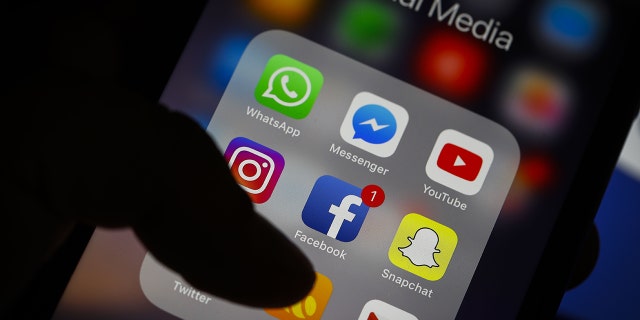NEWYou can now listen to Fox News articles!
The Biden administration’s disinformation czar claimed in a book she authored this year she will not be “silenced” on social media as she pushed back against what she considered to be “harassment” from men whenever she shared opinions online.
She claims the “infrastructure of the internet is built for men.”
In her recent book, “How to Be a Woman Online,” Nina Jankowicz raises concerns on a number of subjects surrounding the backlash women face online, placing great focus on how men respond to what she has to say.
WHITE HOUSE ‘DISINFORMATION CZAR’ NINA JANKOWICZ MAKES TIKTOK ACCOUNT PRIVATE
“We accept that harassment of women is simply the cost of their social media engagement, or worse, that women are expected to endure harassment and silencing in the name of ‘free speech.’ It is long past time for that to change,” she wrote in one passage of the book released in April.
Nina Jankowicz will be the executive director of the Department of Homeland Security’s Disinformation Governance Board.
(Arkadiusz Warguła/iStock)
Jankowicz also suggested that the negative feedback she receives from men online violates her “basic democratic and human rights” and is meant to “silence” her and other women, concluding that comments from men “change how women engage online.”
“[T]he relentless stream of online misogyny to which I and millions of other women who deign to engage in public discourse have been subject sometimes rattles me,” she wrote. “I may have a slightly thicker skin than some, but watching thousands of strangers criticize my appearance, experience, and expertise is not easy. Watching them objectify me is not easy. Watching them deny me and other women our basic democratic and human rights is not easy. And watching these attacks be ignored as ‘the cost of doing business’ in an age where an online presence is all-but-required is enraging.
“To be a woman online is an inherently dangerous act,” she claimed. “The attacks we endure are meant to silence us. They are meant to encourage us to stay home in ‘traditional’ women’s roles and not engage in politics, journalism, activism, academia, or public life more broadly. … However nonsensical, however baseless and uninformed, there is plenty of evidence that suggests these attacks change how women engage online.”
Bringing race into the equation of “online misogyny,” Jankowicz wrote that she, as a “straight, cisgender, white woman,” cannot imagine how a woman “who is part of another ethnically, racially, or sexually marginalized group” deals with online experiences. According to Jankowicz, those women are “even more likely to be targeted, and the attacks are likely to be more vicious.”
Highlighting a term from activist Van Badham called “the engagement boner,” Jankowicz described her view of online encounters with men, telling readers that it “is helpful to be acquainted with their various incarnations before you encounter them so you do not mistake their initial approach as anything other than bad-faith.

Social media icons
(Muhammed Selim Korkutata/Anadolu Agency/Getty Images)
“They burst violently into your mentions and your life like the Kool-Aid man, demanding your attention, hawking opinions that they believe are unarguably, manifestly correct and indispensable,” Jankowicz continued. “‘PAY ATTENTION TO ME!’ they bellow. ‘MY OPINION MATTERS!’ What drives much of this behavior, whether it is laden with misogynistic slurs or couched in outwardly polite language, is what Van Badham calls ‘the engagement boner’ — when users get so excited about interacting with someone whose opinion they value that they cross the line into pestering, harassing, or abusive behavior.
“The engagement boner rears its ugly head in any genus of troll you encounter online,” she added. “The trolls may write differently, or lash out differently, or become grotesquely fixated on different parts of your appearance or background, but ultimately, what motivates them is engagement with you. This, they hope, will encourage you to finally shut up and make room for their infinitely more worthy thoughts.”
Noting in the book that she has never “really been afraid” to voice her opinions around men, Jankowicz reflected on the time she “pecked a little boy in the face while dressed up as a ‘bird princess’ on Halloween” when she was in the first grade.
While there is little context for the pecking incident, Jankowicz included a message she wrote in her first-grade journal which stated, “Today I am a bird … I am sad peple macke [sic] fun of me.”
“But I continued to do my best not to let anyone walk all over me,” she added.
Jankowicz also offered broad generalizations in her book as she claimed the “infrastructure of the internet is built for men and with men’s safety in mind,” suggesting that there are no “social mores and boundaries” for men to follow when making comments on social media.
“Women are expected to stoically endure astronomical levels of abuse to simply participate in conversations while navigating a set of social mores and boundaries that simply don’t exist for men,” she said. “When men encounter behavior they don’t like online, they curse. They block. They willingly and openly dogpile and troll. And the world thinks them more manly for it.”
Reflecting on her own experiences, Jankowicz wrote in the book that she is dedicated to ensuring that women have an “equal voice” on social media and said she refuses to “be silenced about our collective experience of harassment, abuse, and inequity, online or off.”
“We have a collective tenacity that, if activated, can challenge the norms that so many have written off as an unfortunate but immutable characteristic of women’s online engagement,” she said. “I am committed to harnessing that tenacity with every tweet, every TikTok, every keystroke, and every click.

Nina Jankowicz will be the executive director of the Department of Homeland Security’s Disinformation Governance Board.
(@wiczipedia Twitter account)
“I will continue to invest in the time-consuming and sometimes-expensive practices, where my resources allow, to enable myself and others to speak out,” she continued. “I will familiarize myself with platform policy and use it to create a more equitable online environment. I will build a circle of solidarity that is inclusive and supportive, committed to amplifying other women. I will seek help from friends, family, colleagues, and professionals when I need it.
CLICK HERE TO GET THE FOX NEWS APP
“I will do this because the internet is a critical public space for discussion, politics, activism, and expression,” she added. “Until women — all women, no matter their race, sexual identity, religion, or ability — have an equal voice there, we aren’t truly equal anywhere.”
Republicans have derided both Jankowicz and the Biden administration’s new disinformation board established through the Department of Homeland Security, arguing it is little more than a “ministry of truth.” Republicans on Capitol Hill have pointed to Jankowicz’s past endorsements of disinformation as well as her efforts to suppress accurate news events that were harmful for Democrats.
Fox News’ Anders Hagstrom contributed to this article.